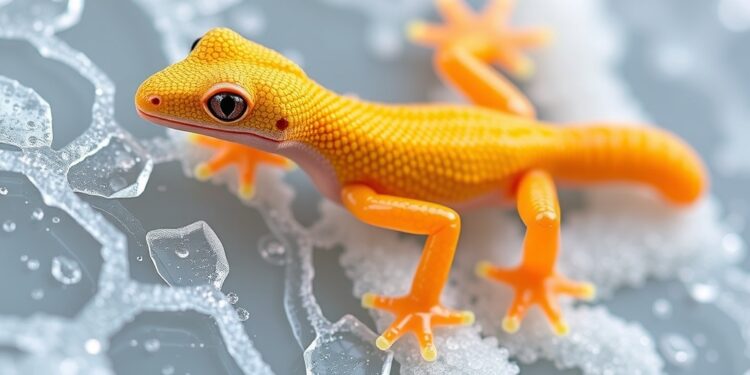A groundbreaking material inspired by the remarkable adhesive properties of gecko feet has emerged as a promising solution to combat the ubiquitous hazard of slips and falls, particularly in icy conditions. Researchers have developed a new slip-resistant polymer composed of silicone rubber and zirconia nanoparticles, designed to replicate the gecko’s natural ability to navigate slippery surfaces effortlessly. This innovative material could potentially be integrated into shoe soles, significantly reducing the risk of injuries due to slipping on ice, which is known to account for a substantial proportion of annual accidents.
The alarming statistics surrounding slips and falls highlight an urgent need for preventive measures. The World Health Organization reports over 38 million injuries and 684,000 fatalities each year attributed to slip-related incidents, with nearly half occurring on ice. Traditional anti-slip shoe soles utilize materials such as natural rubber, which effectively repels water on wet pavement but falter on icy surfaces. The pressure exerted by a person’s weight can cause the ice to melt, thereby creating the very slippery conditions these shoes are supposed to mitigate. This underscores the necessity for a novel solution that performs effectively in a variety of adverse conditions.
The work of scientists Vipin Richhariya, Ashis Tripathy, Md Julker Nine, and their colleagues identifies the intricate forces at work within gecko footpads. Their effectiveness arises from hydrophilic capillary-enhanced adhesion, where water is drawn into narrow grooves, creating suction that aids the gecko in maintaining traction on wet surfaces. Taking cues from this biological phenomenon, the research team set out to develop a polymer capable of emulating this capillary action and providing reliable adhesion on both wet and icy paths.
To achieve this, the researchers incorporated zirconia nanoparticles into a silicone rubber matrix. This formulation was specifically chosen for its inherent properties that promote water attraction, enhancing the material’s ability to grip slippery surfaces. Through innovative processes involving heat curing and laser etching, the team transformed the composite into a thin film with a grooved surface pattern. This pattern maximizes the exposure of hydrophilic zirconia nanoparticles, ultimately allowing the film to engage in effective capillary action when in contact with water.
The testing phase involved assessing various compositions of the nanocomposite, varying the zirconia nanoparticle content across five different concentrations: 1%, 3%, 5%, 7%, and 9%. Infrared spectroscopy techniques, combined with simulated friction tests, allowed the researchers to evaluate each formulation’s slip-resistant properties. The findings revealed that the most effective anti-slip capabilities were found within the 3% and 5% zirconia concentrations, highlighting the delicate balance required in material composition to maximize adhesion.
The implications of this research reach beyond footwear; the technology could pave the way for advancements in medical applications, such as the development of electronic skin or artificial skin prosthetics. By utilizing polymers that can interact with fluid layers between different surfaces, these innovations could dramatically improve the functionality and comfort of medical devices designed for skin replacement or repair.
Future iterations of the gecko-inspired polymer could see enhancements that further improve its slip-resistant properties, potentially incorporating additional biomimetic features from other organisms known for their grip and adhesion. Such advancements could revolutionize numerous industries, including sports footwear, medical equipment, and even automotive sectors, where slip resistance is crucial for safety and performance.
As the research continues to advance, the team is focused on not only refining the material properties but also exploring scalability for commercial production. The vision is to create a widely available product that significantly reduces the incidence of slips and falls, thus improving public safety and quality of life, especially for vulnerable populations like the elderly.
By drawing on nature’s designs, this scientific endeavor represents a remarkable convergence of biology and technology. It exemplifies how understanding the mechanics of natural organisms can inspire innovative solutions to modern problems, aligning with broader sustainability goals by potentially reducing waste and resource use through more effective material designs.
In summary, the development of a slip-resistant polymer inspired by gecko footpads holds significant promise in the fight against slips and falls. By offering a solution that works effectively in both wet and icy conditions, this innovative material could make a meaningful impact on public health and safety, ultimately preventing countless injuries and saving lives.
Subject of Research: Gecko-inspired slip-resistant polymer for shoe soles
Article Title: “Capillary-Enhanced Biomimetic Adhesion on Icy Surfaces for High-Performance Antislip Shoe-Soles”
News Publication Date: 26-Dec-2024
Web References: ACS Applied Materials & Interfaces
References: N/A
Image Credits: N/A
Keywords
Tags: advances in polymer engineeringcombating icy surface hazardseffective anti-slip solutionsgecko-inspired adhesive technologyice-defying shoe solesimproving footwear safetyinnovations in material scienceinnovative solutions for winter safetyreducing slip and fall accidentssilicone rubber and zirconia nanoparticlesslip-resistant polymer developmentstatistics on slip-related injuries





